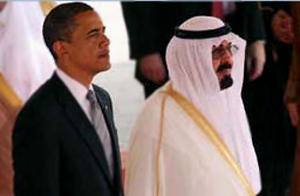
[HOME ] [ABOUT] [PHOTOS] [VIDEO] [BLOG] [HOUSTON] [TEXAS] [U.S. NEWS] [WORLD NEWS] [SPORTS] [POP CULTURE] [CONTACT]
Obama reports to king as US-Saudi ties face new pressures

by Joseph Earnest April 18, 2016
Newscast Media WASHINGTON—Over the last seven decades, photographs of American Presidents side by side with the Kings of Saudi Arabia have provided visual evidence of an enduring, strategic alliance between the United States and the oil-rich kingdom in West Asia.
On Wednesday, President Barack Obama will add one more photo to the scrapbook when he arrives in Riyadh, the Saudi capital, for a private meeting with King Salman, Saudi Arabia’s 80-year-old monarch.
But the expected image of the two leaders will fail to convey the depth of the strain on the relationship between Saudi Arabia and the United States. During Mr. Obama’s tenure, there has been distrust and disagreement over how to contain Iran, the fight against the Islamic State, the future of Syria and clashes in Yemen. Blunt comments about the Saudis by Mr. Obama in a recent interview have deepened the ill will.
“The relationship is troubled. It’s rocky,” said Frederic Wehrey, a senior associate in the Middle East Program at the Carnegie Endowment for International Peace. But, he added, “it’s not headed for an impending collapse”.
That is because the two nations still need each other. The U.S. provides military and intelligence support to the kingdom for its regional security, and is expected to announce additional support this week. Saudi Arabia helps fight terror groups like al-Qaeda and remains the second-largest provider of oil imports to the United States, selling about 1 million barrels per day.
Now, with Mr. Obama in the twilight of his presidency, Saudi leaders are looking past him, to the winner of November’s presidential election. In the 70 years since President Franklin D. Roosevelt initiated the alliance at the end of World War II, the Saudis have primarily looked to the United States to help ensure its security in an often unstable region. They want the U.S. to have their back, especially in a potential conflict with Iran, their longstanding regional rival.
That has meant, for the most part, military equipment: The U.S. has helped Saudi Arabia, a Sunni-dominated state, to obtain weapons to deter Iran, a mostly Shiite country. More recently, the Saudis have sought intelligence assistance and training, and the U.S. has given the Saudis targeting and logistical support for their war in Yemen.
This week, the U.S. is expected to announce that it will bolster ballistic missile defences in the region and provide new support for Saudi efforts to counter cyber-attacks from Iran and elsewhere. The United States has looked to Saudi Arabia as a source of stability in the West Asian region, an ally whose oil reserves have only recently begun to diminish in importance for U.S. interests. — New York Times News Service.
Add Comments>>
Source: Hindu Times
|
|
Join the Newscast Media social networks
for current events and multimedia content.
Copyright© Newscast Media. All Rights Reserved. Terms and Privacy Policy
